The 11 best books we read in 2016
The Week's writers and editors reflect on the books we loved reading the most this year
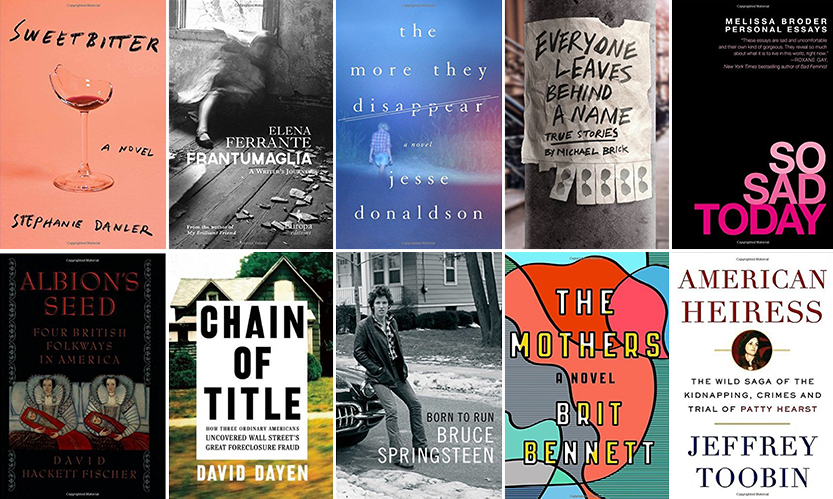
A free daily email with the biggest news stories of the day – and the best features from TheWeek.com
You are now subscribed
Your newsletter sign-up was successful
1. Albion's Seed, by David Hackett Fischer
Rather unusually among wealthy, developed democracies, the people of the United States are almost entirely descended from immigrants, and most of them relatively recently. Albion's Seed, by David Hackett Fischer, is a fascinating ethnographic study into the first four waves of immigration from Britain and Ireland to the United States, starting in the early 1600s. There were the Puritans who landed in New England, the Cavaliers who settled in Virginia, the Quakers who landed in the Delaware Valley, and the Borderers (often also called Scotch-Irish) who landed in Appalachia.
Fischer argues that a great deal of signature American culture and regional character — from sports to language to religion — can be traced back to the wrinkles of original immigrant subcultures. The Puritans were industrious, fervently religious, and repressive; the Cavaliers were aristocratic and brutally hierarchical; the Quakers were gentle, egalitarian, and sexually paranoid; and the Borderers were proud, stubborn, and xenophobic.
The Week
Escape your echo chamber. Get the facts behind the news, plus analysis from multiple perspectives.

Sign up for The Week's Free Newsletters
From our morning news briefing to a weekly Good News Newsletter, get the best of The Week delivered directly to your inbox.
From our morning news briefing to a weekly Good News Newsletter, get the best of The Week delivered directly to your inbox.
Though Fischer sometimes overstates his case, the resemblance to modern-day regional cultures, especially in Appalachia, is clear. What's particularly interesting is that many classic American regional dialects can be traced back to obscure regional dialects in Britain and Scotland — where linguistic drift has wiped them out. —Ryan Cooper, national correspondent
2. American Heiress: The Wild Saga of the Kidnapping, Crimes and Trial of Patty Hearst, by Jeffrey Toobin
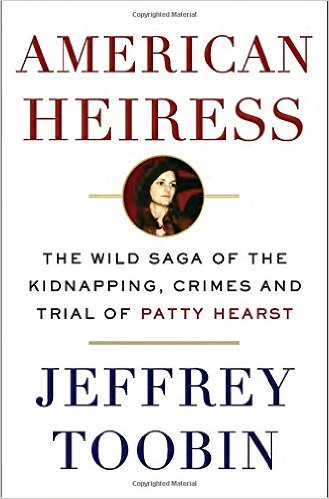
Toobin's latest book details the saga of publishing heiress Patricia Hearst, who was kidnapped from her Berkeley, California, apartment in 1974. Hearst's cushy student life quickly gives way to a dark new reality, first as she's kept hostage in a small closet by an improvised rebel army, and later as she seemingly joins the mission of the ragtag bunch that robbed her of her freedom.
The central question of Hearst's ordeal is whether she joined the bombings, robberies, and shootouts of her peers willfully, or under duress and fear for her life. Her own take on the matter waffles in the "communiques" released during her 19-month captivity and during the months between her capture and her trial, appearing at times the victim and at others a willing participant. Toobin's intricately woven, factually rich narrative makes what should be a cut-and-dry case — kidnappers bad, kidnappee good — into something far more complex. —Kimberly Alters, news editor
A free daily email with the biggest news stories of the day – and the best features from TheWeek.com
3. Born to Run, by Bruce Springsteen
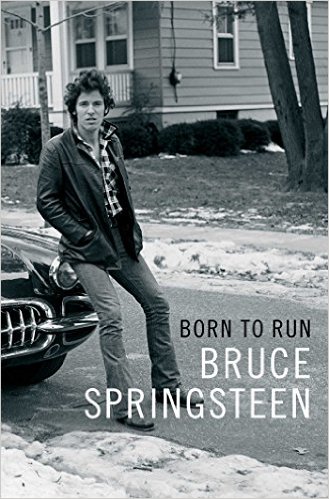
Bruce Springsteen's bestselling memoir Born to Run is every bit as great as everyone says it is, far more engrossing than most rock-star autobiographies, and also far more psychologically honest and thoughtful. Springsteen fans will know most of the names and events recounted here. What's new is the perspective of a man who's achieved a remarkable degree of wisdom about the demons that drive him.
The Boss has been in psychotherapy (and battling depression) for decades, and the book displays the kind of self-knowledge that comes from years spent doing the hard and painful work of grueling self-examination. He understands himself — his obsessive (and sometimes self-subversive) perfectionism, his emotional remoteness, his compulsion to entertain an audience, his calling to tell the stories of working-class Americans like his troubled (and occasionally abusive) father, and his restless striving to find redemption in the Church of Rock 'n' Roll.
The collective experience of a rock concert is where Springsteen finds elusive peace and fulfillment. Yes, in part, from the hours-long adulation of thousands. But also from the quasi-liturgical ritual of communion with the crowd. It's a connection rooted in songs of everyday toils, triumphs, defeats, and the ecstatic celebration of life itself, all of them sung from the standpoint of ordinary men just trying to find their way in the world. Like the singer himself. —Damon Linker, senior correspondent
4. Chain of Title, by David Dayen
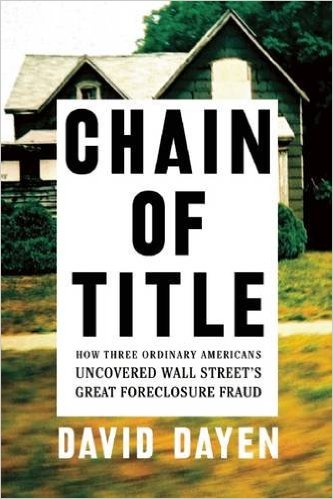
So much happened during the 2008 financial crisis that it was difficult to keep track of it all — the housing bubble burst, banks failed, businesses shuttered, and massive layoffs led to prolonged unemployment. David Dayen's Chain of Title: How Three Ordinary Americans Uncovered Wall Street's Great Foreclosure Fraud is here to help you make sense of it all.
Dayen offers a startling window into what it was like for Americans dealing with foreclosures — and the fraudulent evidence mortgage companies used to get people out of their homes. Some of the anecdotes will make you rage — one homeowner was foreclosed upon after underpaying the mortgage by just a few cents. But there are moments of inspiration, too, like the story of Lisa Epstein, a nurse who juggled raising her young daughter with learning the intricacies of the legal system and mortgage documentation. You'll root for her as she pieces together what she's up against — biased judges, foreclosure mills churning out forged documents, and lenders who really don't care if she and her daughter have a place to live.
Chain of Title focuses on homeowners in Florida, but Dayen deftly explains how mortgage fraud hurt people across the United States. There were a few times where I couldn't believe what I was reading, thinking there was no way some of these mortgage companies could be so blatantly dishonest, but as one of the victims of the crisis told Dayen, "I don't believe your book. I lived through it, and I don't believe it." Chain of Title may cause your blood pressure to rise, but it's a very important wake-up call that gives insight into what some people are willing to do for a buck. —Catherine Garcia, staff writer
5. Everyone Leaves Behind a Name: True Stories, by Michael Brick
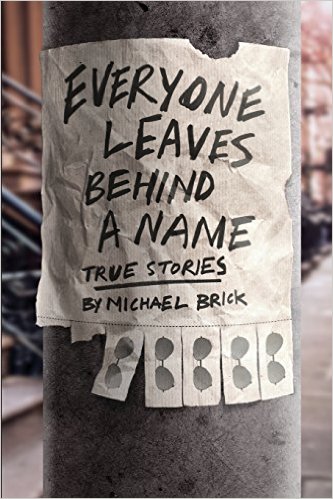
Journalism had a rough 2016 — only 22 percent of Americans gave the press a passing grade in covering the presidential election, according to Pew. But journalism is more than just reportage. There's also the kind of journalism that tells stories about American lives, about people we wouldn't otherwise meet. Michael Brick, a close friend and my former bandmate, was a master of that kind of journalism. When he died in February, at age 41, some friends and admirers rushed out a collection of curated articles he wrote for various newspapers and magazines, with introductions to each story from a former colleague or fan.
The book should be required reading for journalism classes, but it is also a great collection of short stories with truly memorable characters. There's the almost-pro football player, the mysterious and vaguely menacing figure organizing a cross-country motorcycle race, the Brooklyn hipster leaving his "truly dope" loft for a more respectable future, the regulars of a Coney Island bar at the end of the season, to name a few. These people and stories could be fiction, but they're not. And the compassion Brick had for each one of them shines through in his prose. It's a testament to his talent and heart that he got some of these stories past his editors at The New York Times. —Peter Weber, senior editor
6. Frantumaglia, by Elena Ferrante
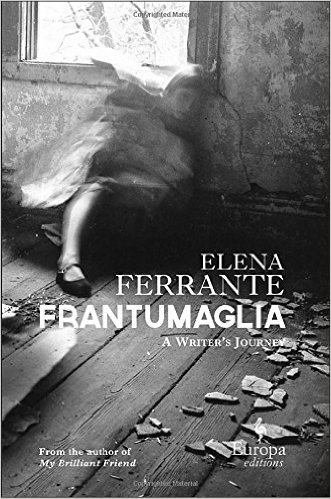
Elena Ferrante's Frantumaglia is a fascinating, epistolary, experimental treatise on the way pseudonymity made it possible to write in a toxic literary culture that demands celebrity and publicity, flattens the author into the work, and capitulates to a self-promoting attention economy that makes good writing (for Ferrante at least) impossible to produce. The English translation of this book came at a major flashpoint in the literary world this year. The famously reclusive author of the Neapolitan novels, whose real name has remained a secret for over two decades, was exposed (allegedly) by a misguided Italian journalist.
Frantumaglia is fragmentary and strange. It is also, in its avoidant, fractured way, dedicated to resisting the ugly tendency we have to conceive of female writers as either incapable of real art — by claiming, for example, that their novels are "just" thinly-veiled autobiography (a claim made often about Ferrante's fiction) — or by assuming that they are liars, particularly when they do claim to be writing autobiography (sorry, memoir). The Italian journalist who allegedly outed Ferrante opted for the latter charge.
People often want to engage with Ferrante's work by finding out more about her. She will not make herself available, but she will talk to them, and talk about everything else: surviving in the age of Berlusconi, the male authors that she associated with greatness in her youth, the way you collaborate with a moviemaker who is making a film of your work, and what that feels like. —Lili Loofbourow, culture critic
7. The Mothers, by Brit Bennett
Brit Bennett. Write her name down. She is the next great voice in American letters.
The Mothers, far and away the best book I picked up this year, is Bennett's debut. The novel follows Nadia Turner, who becomes pregnant by the local pastor's son. But Nadia isn't necessarily the titular mother. Nadia is also mourning the death of her own mother, whose suicide is still a fresh and open wound. Then there are "the mothers," the older churchwomen who have seen and lived through all that life can throw at a woman. It's never quite clear which mother Bennett is talking about with the title of her novel — and be warned, if firm conclusions are what you seek in your reading, The Mothers may leave you frustratingly unsatisfied. But for a haunting dose of life — with all the humor and poetry and hurt that it has to offer — The Mothers is a beautiful and unforgettable place to begin. —Jeva Lange, staff writer
8. The More They Disappear, by Jesse Donaldson
This thriller (written by a longtime friend of mine) is set in rural Kentucky, and takes a stark look at the burgeoning OxyContin trade in the late 1990s. After the sheriff of Marathon, Kentucky, is murdered by a drug-addicted teenager, chief deputy Harlan Dupee is tasked with solving the crime in a town filled with half-constructed homes and teenagers picking through burned-out trailers for fun. The people of Marathon hurt.
Using the bare language befitting such a locale, Donaldson zeroes in on each character's pain with a sniper's precision: "Sometimes she felt less like a daughter than a warehouse to store her parents' grievances." Oxy offers a way out — the chance of power, money, escape, oblivion.
Though the murder at the heart of the book unfolds in the first chapter, The More They Disappear develops with calculating suspense. There isn't much hope to be found in Marathon, but the bleak story is buoyed by Harlan Dupee, a flawed but honest man who, once given the space to grow, becomes the sheriff and hero the people of Marathon need. — Lauren Hansen, executive editor of multimedia
9. So Sad Today, by Melissa Broder
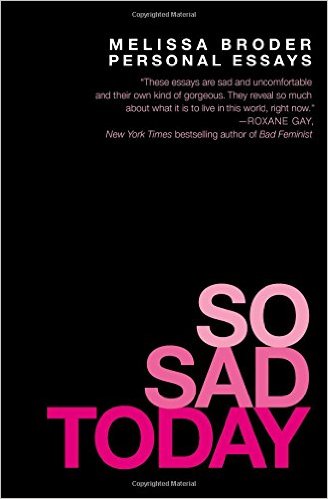
Melissa Broder is the writer and poet behind the Twitter handle @sosadtoday, an existentially depressed online persona delivering darkly hilarious one-liners on sex, love, and crippling anxiety. In her new book of the same name, Broder fleshes out these relatable terrors into a series of uncomfortably blunt personal essays — and the word "essays" is used loosely here. One chapter, for example, is just a series of grim, hypothetical love story titles ("I don't even masturbate to you anymore because it's too sad: a love story"); another features a dozen pages of actual sexts between Broder and a mysterious younger man she met on the internet.
It's startling and deeply satisfying to read someone's shameless airing of humiliating and hideous vulnerabilities in such graphic detail: obsessively checking all of her ex's social media accounts hourly, falling down a rabbit hole of self-hatred every time she opens the refrigerator, and constantly feeling like she doesn't deserve love and compassion even though she's acutely aware that's just her mental illness talking.
Reading this feels good and even cathartic. Wallow in brutal self-loathing. Indulge your basest emotions. We don't do it enough. —Kelly Gonsalves, editorial assistant
10. Sweetbitter, by Stephanie Danler
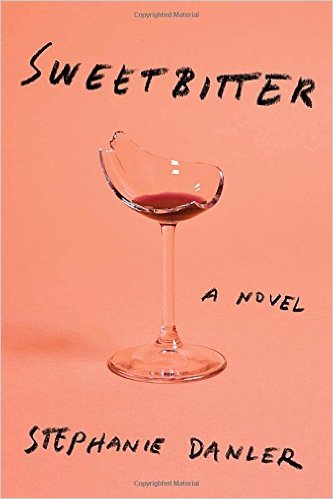
Sweetbitter, Stephanie Danler's debut novel, is refreshingly raw, and quite dark for what might at first glance seem like a light-hearted coming-of-age story about a 22-year-old girl named Tess working at a fancy restaurant as she tries to make her way in the Big Apple. Danler manages to drive the story to incredible depths, digging into the icky realizations that come with growing up, as Tess learns that with glamour comes grit. As the charms of New York and endless nights of drinking and drugs wear off, Tess comes to realize that sometimes the grown-ups we idolize are far from perfect, and that bad-boy bartenders maybe aren't so hot after all. —Becca Stanek, staff writer
11. Will this Do? by Auberon Waugh
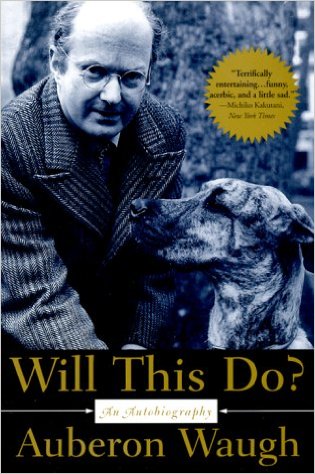
Auberon Waugh's memoirs, published in 1991, were new to me this year. In extremely witty prose, Waugh recalls the trials and indignities of being the son of the famous English Catholic novelist Evelyn Waugh. He also shares what it was to be a Fleet Street veteran in London's never-ending media war. Waugh knows what to do with a poison pen, whether he is aiming it at his teachers, his journalistic rivals, or socialist politicians. The many libel trials in which he was a defendant are entertaining in themselves. But the book is also a tender affair in parts. There is a rueful war remembrance of what it was to be an activist journalist on behalf of starving Biafrans in Nigeria. Or observations on the early career of media maven Tina Brown. The book is good gossipy fun, especially for Anglophiles of a certain age. —Michael Brendan Dougherty, senior correspondent
-
 How the FCC’s ‘equal time’ rule works
How the FCC’s ‘equal time’ rule worksIn the Spotlight The law is at the heart of the Colbert-CBS conflict
-
 What is the endgame in the DHS shutdown?
What is the endgame in the DHS shutdown?Today’s Big Question Democrats want to rein in ICE’s immigration crackdown
-
 ‘Poor time management isn’t just an inconvenience’
‘Poor time management isn’t just an inconvenience’Instant Opinion Opinion, comment and editorials of the day